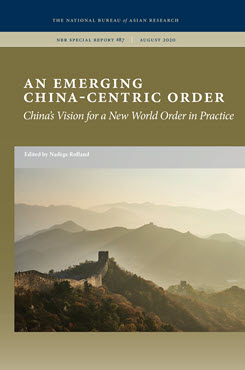NBR Special Report no. 87
China’s Engagement with Cambodia
Developing a Strategic Foothold in Southeast Asia
This essay examines China’s efforts to cultivate relations with Cambodia and expand China’s footprint in Southeast Asia through economic, political, and security engagement.
Executive Summary
MAIN ARGUMENT
After decades of playing multiple patrons off of each other, Cambodia’s strongman prime minister Hun Sen has come firmly into China’s orbit as Cambodian relations with both the United States and the European Union deteriorate. Although Hun Sen frequently rejects any notion that Cambodia is effectively a vassal state of the People’s Republic of China (PRC), his government’s actions, as well as the PRC’s actions in Cambodia, suggest that Beijing wields a high degree of leverage over this strategically located country. China has become Cambodia’s most important economic and political partner and gives Hun Sen, often criticized by the West on human rights and other issues, international standing. Based on developments in bilateral relations over the past five to ten years, China’s strategic vision for Cambodia is multifaceted. Economically, Cambodia is a market for technology and a destination for industrial overcapacity and infrastructure projects. Politically, it can be trusted to vote on China’s behalf in the United Nations and the Association of Southeast Asian Nations (ASEAN). From a security perspective, Cambodia has the potential to greatly expand the People’s Liberation Army’s regional footprint and ability to project force. Given these benefits from the relationship, the PRC has made great efforts to ensure the stability of the increasingly authoritarian Hun Sen regime.
POLICY IMPLICATIONS
- Should China’s relationship with Hun Sen and Cambodia continue on its current path, the U.S. and Japan will increasingly need to view Cambodia as an ally of the PRC, and potentially a jump-off point for Chinese military operations in the South China Sea and beyond.
- China’s growing presence in Cambodia effectively surrounds Vietnam with Chinese military assets or friends and affects the strategic calculus for Thailand, Singapore, Malaysia, and Indonesia, potentially giving Beijing greater sway over ASEAN. Successful Chinese subordination of ASEAN would have ramifications beyond the region.
- While to some degree Hun Sen is subordinating Cambodia’s domestic interests to Beijing’s strategic interests, a close relationship with China offers the kingdom a more substantial international profile. Many Cambodians, especially those in positions of power and influence, may be receptive to closer ties with their giant neighbor to the north.
Chris Horton is a journalist based in Taipei. His articles have appeared in the New York Times, Atlantic, Nikkei Asian Review, Financial Times, and Guardian, among other publications.



